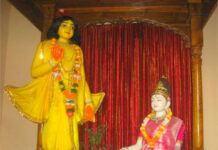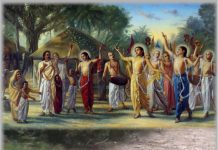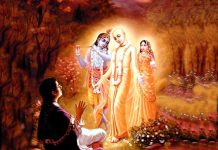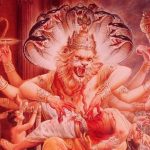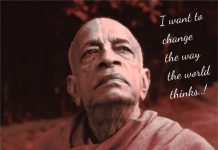Appearance of an acharya in this world is by no means an ordinary thing. Such acharyas are some of the most confidential servants of the supreme personality of Godhead. They come for accomplishing certain missions. As oppose to worldly missions by many others based on personal likes and dislikes, missions carried out by acharyas are directly under the instructions and direction of God. Srila Bhaktivinod Thakur was one such acharya who appeared on this planet in 18th century. His contribution to the upliftment of mankind, especially in the field of spirituality, has been immense although not all of us are aware of it.
“Out of compassion, the most munificent incarnation, Sri Chaitanya Mahaprabhu sent his eternal associate Srila Bhaktivinoda Thakur into this world in order to reclaim those bewildered souls back to the path of divine love. Possessed of superhuman prowess, Srila Bhaktivinoda Thakur wrote more than a hundred books in several different languages with the goal of defeating all the unorthodox views opposed to the true teachings of Sri Chaitanya Mahaprabhu.” – Srila Bhaktivinod Thakur’s not-so-known contribution
Last year on Srila Bhaktivinod Thakur’s appearance day we published a few words from his book Bhakti-tattva viveka. In this article we will read more from the same book.
Srila Bhaktivinod Thakur says that by negation one does not realize the Absolute Truth
Those who try to perceive the Absolute Truth through the cultivation of jnana cannot realize anything beyond brahma-tattva. Through such spiritual endeavour they try to cross material existence by negation of the qualities of the material world (neti-neti); thus they imagine brahma to be inconceivable, unmanifest, formless and immutable.

But merely imagining the absence of material qualities does not grant one factual realization of the Absolute Truth. Such spiritualists think that because the names, forms, qualities and activities in the material world are all temporary and painful, the brahma which exists beyond the contamination of matter cannot possess eternal names, forms, qualities, pastimes and so on.
They argue on the basis of evidence from the shrutis, which emphasize the absence of material attributes in the Supreme, that the Absolute Truth is beyond the purview of mind and words, and that it has no ears, bodily parts, limbs and so on.
These arguments have some place, but they can be settled by analyzing the statement of Advaita Acharya found in the Sri Chaitanya-chandrodaya-natakam (6.67) written by Kavi Karnapura:
ya ya shrutir jalpati nirvishesham sa savidhatte savishesham eva
vicharayoge sati hanta tasam prayo baliyah savishesham eva
In whatever statements from the shrutis where the impersonal tattva is indicated, in the very same statements personal tattva is also mentioned. By carefully analyzing all the statements from the shrutis as a whole, we can see that the personal tattva is emphasized more. For example, one shruti says that the Absolute Truth has no hands, no legs and no eyes, but we understand that He does everything, travels everywhere and hears everything. The pure understanding of this statement is that He doesn’t have material hands, legs, limbs and so on as conditioned souls do. His form is transcendental, meaning that it is beyond the twenty-four elements of material nature and purely spiritual.(from Part 1 – “The Intrinsic Nature of Devotion”)
Next, Srila Bhaktivinod says what happens when the Absolute Truth is realized only partially.
By the cultivation of jnana it will appear that impersonal brahma is the supreme tattva.
Here the subtlety is that jnana itself is material, meaning in the material world whatever knowledge we acquire or whatever principle (siddhanta) we establish is done by depending solely upon material attributes. Therefore, either that principle is material or by applying the process of negation of the material (vyatireka) we conceive of a principle which is the opposite of gross matter, but by this method one cannot achieve the factual supreme tattva.
Quoting from Bhakti-sandarbha by Srila Jiva Goswami Srila Bhaktivinod Thakur explains how Srila Jiva Gosvami has outlined the tattva which is attained by those who pursue the path of impersonal jnana:
“In the beginning the students who are pursuing the path of jnana require sufficient discrimination to comprehend the existence of a transcendent entity (chinmaya-vastu) which is beyond the contamination of gross matter. Although the specific attributes of Godhead established by the potencies inherent within the Lord’s very nature are intrinsically present within that transcendent entity, the adherents of the path of jnana are unable to perceive them. For example, the sun is a luminary which dispels the darkness of night.
Although its luminous quality is easily understood, the inner and outer workings of the sun planet, the difference which exists between individual particles of light, and the specific distinguishing features of the innumerable atomic particles of light are all imperceptible to human eyes. Similarly, those who view the transcendent entity through the eyes of impersonal jnana are unable to perceive the Lord’s divine personal attributes. If, as previously described, one acquires transcendental vision by the special mercy of great devotees, one will be able to directly recognise the Lord’s personal attributes. Otherwise, by realisation of the impersonal existential brahma, one will attain only the state of merging into that brahma.” (Anuccheda 214)
“This knowledge is stated in the Bhagavad-gita (8.3): svabhavo ’dhyatman ucyate — ‘The inherent nature of the living entity is known as the self.’ The meanings of the words svabhava and adhyatma are as follows. Sva refers to the shuddha-atma or pure self, and the word bhava refers to ascertainment. Consequently the ascertainment of the pure living entity as a unique individual, eternally related to the Supreme, is known as svabhava. When the atma or self is made the principal subject of focus and thus given the power to act in its proper function, it is known as adhyatma.” (Anuccheda 216)
The purport of this is that when spiritual knowledge is acquired through the process of negation (neti-neti), the Absolute Truth, which is transcendental to maya, is realised only partially. The variegated aspect of transcendence which lies much deeper within is not realised. If one who follows this process meets a personalist, self-realised Vaisnava guru, then only can he be protected from the anartha of impersonalism.(from Part 1 – “The Intrinsic Nature of Devotion”)


